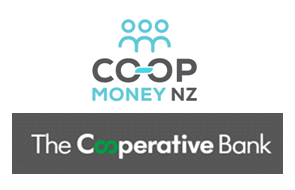
CEO Bruce McLachlan says the Co-operative Bank has filed an application for a court injunction against the New Zealand Association of Credit Unions (NZACU) to as it strives to stop NZACU rebranding to use the names "Co-op Money” and “Co-op Insurance."
McLachlan told interest.co.nz the Co-operative Bank was "deeply concerned" that two organisations in the same sector will have near-identical names, which could lead to serious confusion in the market-place and with customers. The injunction application will be heard on October 8.
"The Bank has attempted to resolve this issue directly with the NZACU, but despite our best efforts has been unable to. The filing of the injunction application has been taken as a last resort," McLachlan said.
"This issue is important for the Bank and we will do everything reasonably necessary to avoid the confusion for our customers, that is why we have filed for an injunction. The matter is now before the courts so we are unable to make any more comment on it." McLachlan added.
On June 5 the NZACU announced plans to begin trading as Co-op Money NZ from mid-July. CEO Henry Lynch said the NZACU had been operating as a co-operative and representing the financial co-operative movement for over 50 years, and had decided it was time its brand better reflected the "modern, friendly nature" of its members as they are today.
Today Lynch said the NZACU had chosen a name that accurately reflects what its organisation does for its members, its new logo is "completely different" from the Co-operative Bank’s logo as can be seen when they are side by side, and NZACU will not be trading with the public as Co-op Money NZ, meaning there's "no prospect of any confusion."
"We are a business to business organisation we do not collect deposits or lend money out to people," Lynch said. "This is not about the Bank protecting its rights. It is about the Bank attempting to monopolise 'Co-operative' and 'Co-op,' to the exclusion of other co-operatives in NZ."
"It is a pity that the Co-operative Bank have taken this stance and not wanted to cooperate and coexist as part of the Cooperative NZ community," added Lynch.
'No desire for confusion, they want to monopolise a generic word'
NZACU represents 22 credit unions and mutual building societies, with about 205,000 members. The Co-operative Bank was formerly known as PSIS and changed its name in 2011 when it obtained banking registration from the Reserve Bank.
"I would like to reiterate that we have absolutely no desire for there to be any confusion between our operations and the Co-operative Bank," Lynch said.
"We have reiterated this in writing to the Co-operative Bank many times as we have a distinctly different name and a completely different logo, and are not in the same field of activity and we do not deal with the general public. So there is no real scope for confusion to arise. We have suggested in writing to the Co-operative Bank that the sensible course of action is for the bank to co-exist with us in the same way that we all have to co-exist with all other co-operatives which wish to describe themselves as such."
"We have operated as a co-operative for over 50 years in NZ and take exception to any organisation that has only in recent times, less than three years, used the generic word in their name and now wish to monopolise its use and thereby potentially preventing small community organisations from using that word," said Lynch.
Last month Lynch told interest.co.nz the Co-operative Bank didn't have a monopoly on the word "cooperative" let alone "co-op." And at that time McLachlan said the Co-operative Bank had "not invited this disagreement." But NZACU choosing a name that was so similar was causing concern.
3 Comments
you can have a monolopy on a word like 'co-operative' if used in a specific and distinctive way that would be take as use as a trade mark (origin of the goods/services), or aquired distinctiveness through use/reputation. Intercity is almost 100% descriptive and lacks distinctiveness, but successfully held that nakedbus had infringed its TM in advertising by using the word as an indicator of origin of the goods (not just using it purely descriptively).
Assuming no nz reg TM exists, they will be relying on passing off and the FTA, s9, s11 which is concerned with the relevant actual use and relevant reputations of the relevant marks. Likely to mislead or decieve, liable to mislead or decieve? How are the marks being used? If always used with the distinctive get up/logo (never used just as plain text) then can argue that they lack similarities where a reasonable average consumer would likely be mislead or decieved (needs to be more than a mere possibility). Lawyer up, things like this can go either way.
You can still use co-operative or radler or intercity descriptively, just don't try and use them as a trade mark to indicate where the goods or services come from. One should ask the question, why would they even want to include the word 'co-op' in their name? Do they feel the need to add the descriptive information inherited in the word into the name? I think if you take a hard honest look, the phrase 'co-op' in 'co-op money' leads to an indirect association with something one feels very familia and safe with. That familia and safe reputation being a product of other peoples long and prolific use of the word internationally as a badge of origin.


We welcome your comments below. If you are not already registered, please register to comment.
Remember we welcome robust, respectful and insightful debate. We don't welcome abusive or defamatory comments and will de-register those repeatedly making such comments. Our current comment policy is here.